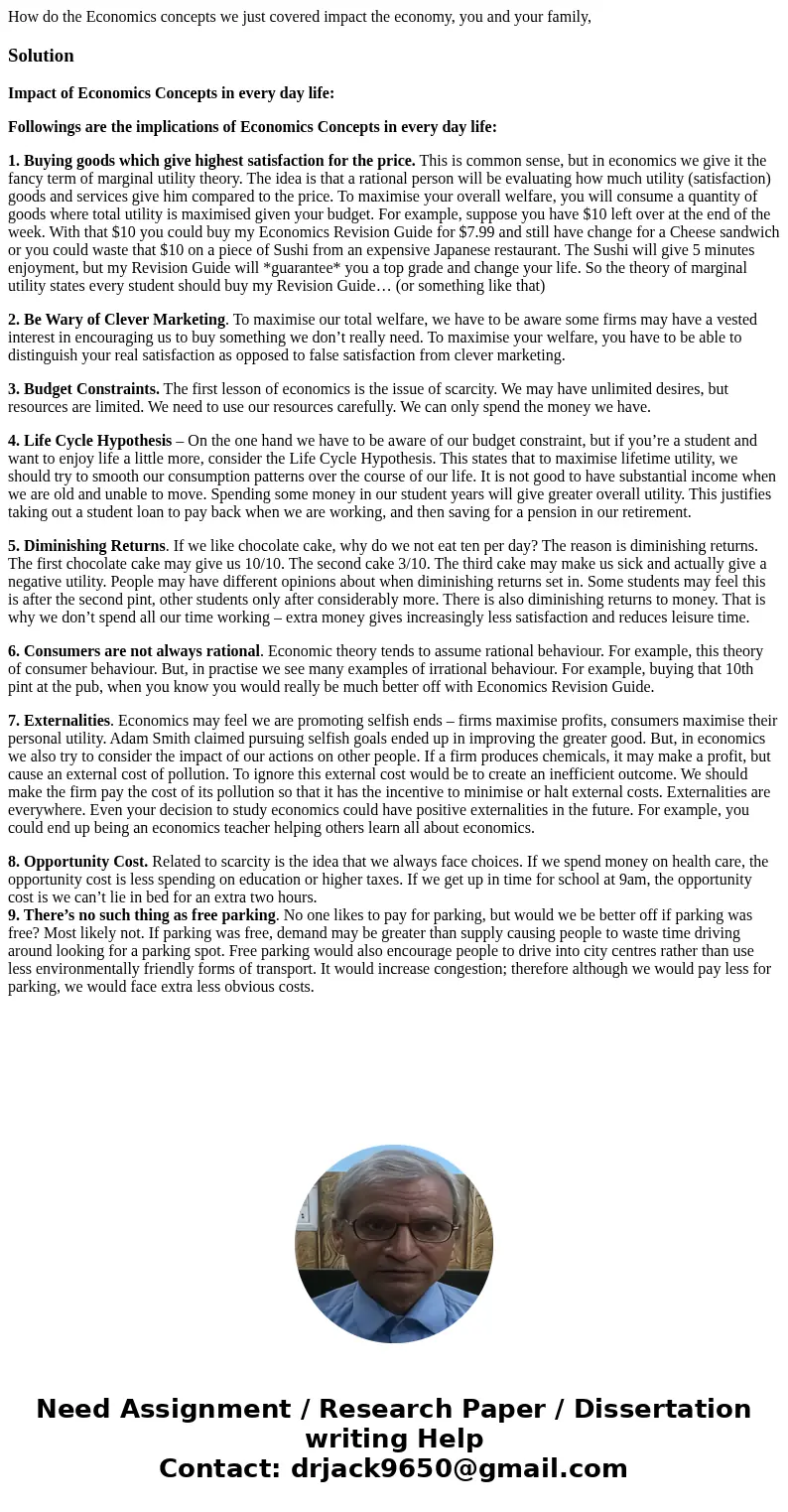How do the Economics concepts we just covered impact the eco
How do the Economics concepts we just covered impact the economy, you and your family,
Solution
Impact of Economics Concepts in every day life:
Followings are the implications of Economics Concepts in every day life:
1. Buying goods which give highest satisfaction for the price. This is common sense, but in economics we give it the fancy term of marginal utility theory. The idea is that a rational person will be evaluating how much utility (satisfaction) goods and services give him compared to the price. To maximise your overall welfare, you will consume a quantity of goods where total utility is maximised given your budget. For example, suppose you have $10 left over at the end of the week. With that $10 you could buy my Economics Revision Guide for $7.99 and still have change for a Cheese sandwich or you could waste that $10 on a piece of Sushi from an expensive Japanese restaurant. The Sushi will give 5 minutes enjoyment, but my Revision Guide will *guarantee* you a top grade and change your life. So the theory of marginal utility states every student should buy my Revision Guide… (or something like that)
2. Be Wary of Clever Marketing. To maximise our total welfare, we have to be aware some firms may have a vested interest in encouraging us to buy something we don’t really need. To maximise your welfare, you have to be able to distinguish your real satisfaction as opposed to false satisfaction from clever marketing.
3. Budget Constraints. The first lesson of economics is the issue of scarcity. We may have unlimited desires, but resources are limited. We need to use our resources carefully. We can only spend the money we have.
4. Life Cycle Hypothesis – On the one hand we have to be aware of our budget constraint, but if you’re a student and want to enjoy life a little more, consider the Life Cycle Hypothesis. This states that to maximise lifetime utility, we should try to smooth our consumption patterns over the course of our life. It is not good to have substantial income when we are old and unable to move. Spending some money in our student years will give greater overall utility. This justifies taking out a student loan to pay back when we are working, and then saving for a pension in our retirement.
5. Diminishing Returns. If we like chocolate cake, why do we not eat ten per day? The reason is diminishing returns. The first chocolate cake may give us 10/10. The second cake 3/10. The third cake may make us sick and actually give a negative utility. People may have different opinions about when diminishing returns set in. Some students may feel this is after the second pint, other students only after considerably more. There is also diminishing returns to money. That is why we don’t spend all our time working – extra money gives increasingly less satisfaction and reduces leisure time.
6. Consumers are not always rational. Economic theory tends to assume rational behaviour. For example, this theory of consumer behaviour. But, in practise we see many examples of irrational behaviour. For example, buying that 10th pint at the pub, when you know you would really be much better off with Economics Revision Guide.
7. Externalities. Economics may feel we are promoting selfish ends – firms maximise profits, consumers maximise their personal utility. Adam Smith claimed pursuing selfish goals ended up in improving the greater good. But, in economics we also try to consider the impact of our actions on other people. If a firm produces chemicals, it may make a profit, but cause an external cost of pollution. To ignore this external cost would be to create an inefficient outcome. We should make the firm pay the cost of its pollution so that it has the incentive to minimise or halt external costs. Externalities are everywhere. Even your decision to study economics could have positive externalities in the future. For example, you could end up being an economics teacher helping others learn all about economics.
8. Opportunity Cost. Related to scarcity is the idea that we always face choices. If we spend money on health care, the opportunity cost is less spending on education or higher taxes. If we get up in time for school at 9am, the opportunity cost is we can’t lie in bed for an extra two hours.
9. There’s no such thing as free parking. No one likes to pay for parking, but would we be better off if parking was free? Most likely not. If parking was free, demand may be greater than supply causing people to waste time driving around looking for a parking spot. Free parking would also encourage people to drive into city centres rather than use less environmentally friendly forms of transport. It would increase congestion; therefore although we would pay less for parking, we would face extra less obvious costs.

 Homework Sourse
Homework Sourse